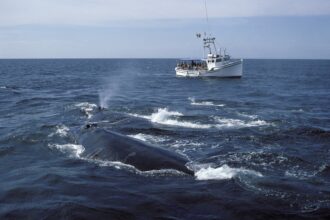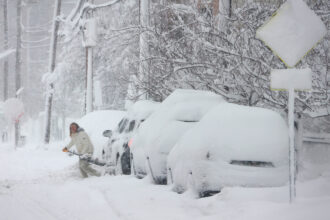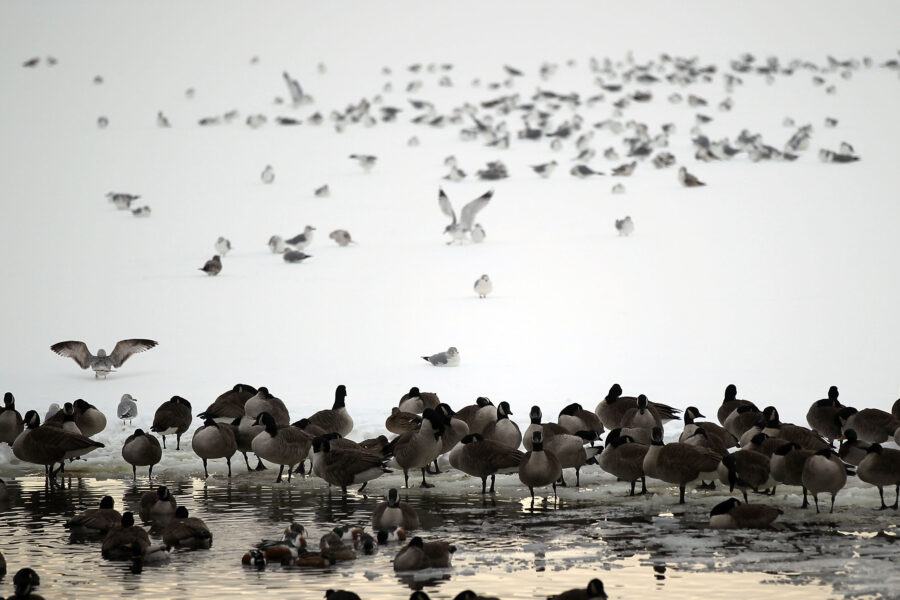In 2015, former U.S. President Barack Obama unveiled the official new—or more accurately, old—name for North America’s tallest peak: Denali. He announced the switch ahead of a trip to Alaska dedicated to underscoring the urgency of climate action as the icy state faces warming temperatures twice as fast as the rest of the country.
Last week, nearly a decade later, President Donald Trump signed an executive order to revert the peak back to its former title of Mount McKinley, named after the 25th U.S. president (who never actually visited the mountain). The decision has sparked backlash from Alaskan lawmakers and citizens, many of whom fought for years to secure the mountain name Denali, which translates to “the High One” in the Alaskan native language of Koyukon.
Meanwhile, in the same order, Trump declared the Gulf of Mexico—the warm waters bordered by several U.S. states and two other countries—would now be deemed the Gulf of America. While symbolic in many senses, these name switchups could have complex cultural, international and even logistical implications, experts say.
Denying Denali: The McKinley-Denali naming controversy stretches back well before the national park surrounding this peak was first established in 1917. Native Alaskan groups each had their own moniker for the mountain, including Denali.
But in 1897, a gold prospector and admirer of William McKinley—a president-elect at the time—dubbed the mountain “Mount McKinley” in an article published by The New York Sun newspaper, according to the National Park Service. When the president was assassinated in 1901, the name started to stick.
In 1975, the state of Alaska petitioned the U.S. Board on Geographic Names to officially change the name of the mountain to Denali, a fight that lasted for decades until Obama’s announcement.
But with Trump’s recent decision, U.S. maps will soon be updated to reflect Mount McKinley. While the broader area will retain the name Denali National Park and Preserve, the order states that McKinley “should be honored for his steadfast commitment to American greatness,” pointing to the former president’s efforts to enact tariffs to protect U.S. manufacturing and boost domestic production. While lawmakers in Ohio—McKinley’s birthplace—praised the move, many people across Alaska spoke out against the name change, including the state’s Republican U.S. senators, Lisa Murkowski and Dan Sullivan.
“You can’t improve upon the name that Alaska’s Koyukon Athabascans bestowed on North America’s tallest peak, Denali – the Great One,” Murkowski said in a statement. “For years, I advocated in Congress to restore the rightful name for this majestic mountain to respect Alaska’s first people who have lived on these lands for thousands of years. This is an issue that should not be relitigated.”
Polling done by Alaska Survey Research earlier in January found that only a quarter of the 1,816 adult Alaskan residents surveyed supported the name change. Prominent climbers and mountain guides told Outside Magazine they would continue calling the peak Mount Denali either way.
“The name Denali reflects a local cultural heritage here that predates the United States,” Mark Westman, an Alaska resident and former ranger on the mountain, told Outside. “The name McKinley was an arbitrary name given for someone who had never even set foot here.”
Gulf of Where? In the same name-swapping order, designed to take effect by mid-February, Trump declared that the Gulf of Mexico will now be known as the Gulf of America “in recognition of this flourishing economic resource and its critical importance to our Nation’s economy and its people.”
But this name change is limited in scope, given that much of the gulf is located in international waters or under the jurisdiction of other countries, experts say.
“For us and for the whole world, it is still the Gulf of Mexico,” President Claudia Sheinbaum of Mexico said at a press conference last week. She’s also joked that North America should be renamed “América Mexicana,” or “Mexican America,” The Associated Press reports.
The move has garnered annoyance and confusion from the international community, The New York Times reports. Changing the widely known name of this body of water could also muddle disaster communications during weather emergencies in the region, which is known for its intense hurricanes, according to Carson MacPherson-Krutsky, a research associate at the Natural Hazards Center at the University of Colorado Boulder.
“We know from risk communication research that this inconsistency in communicating can create a lot of confusion,” she told me. “Changing [geographic names] for political reasons without having … people agree on it can be, I think, very confusing, and just doesn’t promote easy-to-understand messages.”
Anthony Leiserowitz, the director of the Yale Program on Climate Change Communication, told me over email that he thinks people will adjust quickly given the “ubiquity of maps in extreme weather communication.” But he stressed that we won’t know until official forecasts adopt the name and that in the short-term, it could be “confusing to many people who don’t follow political news (many Americans).”
The new name is already gaining traction on some major platforms. Florida Gov. Ron DeSantis referred to the Gulf of Mexico as the “Gulf of America” in a state executive order earlier in January warning residents about the winter weather that hit parts of Florida. Google announced it will update its maps to reflect the Gulf of America—for U.S. users, at least.
More Top Climate News
Trump visited California on Friday to survey disaster zones and meet with survivors of the catastrophic fires across Los Angeles County, which are close to contained. In a meeting with state leaders in Pacific Palisades, he commended firefighters and disparaged state officials, repeating false claims that an endangered fish known as the Delta smelt is the reason for water supply issues during efforts to douse the infernos, Chris Cameron reports for The New York Times. Earlier this month, my colleagues Wyatt Myskow and Martha Pskowski wrote about misinformation like this amid the LA fires, if you’d like to learn more.
On his visit to California and a trip to North Carolina to tour damage left by Hurricane Helene, Trump stated plans to overhaul disaster aid, which included “maybe getting rid of FEMA,” the Federal Emergency Management Agency. As NPR points out, Trump does not have the authority to abolish FEMA without Congress’ approval. Instead, he issued an executive order to trigger a “a full-scale review, by individuals highly experienced at effective disaster response and recovery, who shall recommend to the President improvements or structural changes to promote the national interest and enable national resilience.”
Meanwhile, researchers in California are scrambling to study the impacts of the fires on ocean life, Todd Woody reports for Bloomberg. In September, I wrote about how the ash and toxic chemicals that run off land can soak into lake and marine ecosystems—a phenomenon that could be happening off the LA coast, scientists say. This type of pollution can be toxic to the marine food chain, from plankton to whales.
“The concentration of anthropogenic pollutants that might be entering the water is completely different than those from wildland fires, and we expect there’ll be more ecotoxic effects,” Dante Capone, a scientist at Scripps Institution of Oceanography at the University of California San Diego, told Bloomberg.
Displaced Palestinians returning to Gaza are encountering a variety of environmental health hazards, Tammy Webber reports for The Associated Press. Health officials say the millions of tons of debris and toxic substances left behind by the war could cause long-term issues for people living in the area, which will be tough to treat as the majority of Gaza’s 36 hospitals were damaged or partially destroyed by Israeli bombs. Additionally, a shortage of clean water and widespread sewage overflows could fuel the spread of infectious disease, an ongoing issue since conflict began.
A new study found that extreme heat could kill 50 percent more people in Europe by the end of the century, resulting in an additional 2.3 million deaths. The net death toll is projected to rise the most in the Mediterranean, where summer temperatures have soared to record highs in recent years. A wide body of research shows that rising temperatures could lead to an uptick in ailments like cardiovascular disease, miscarriages and depression, Ajit Niranjan reports for The Guardian.
Newly released data shows that more than 60 percent of the U.S. offshore wind manufacturing and supply-chain investments made or announced are in Republican congressional districts. Jobs in these districts are at risk due to a recent executive order that paused the approval of leases, permits and loans for both offshore and onshore wind energy, Clare Fieseler reports for Canary Media.
About This Story
Perhaps you noticed: This story, like all the news we publish, is free to read. That’s because Inside Climate News is a 501c3 nonprofit organization. We do not charge a subscription fee, lock our news behind a paywall, or clutter our website with ads. We make our news on climate and the environment freely available to you and anyone who wants it.
That’s not all. We also share our news for free with scores of other media organizations around the country. Many of them can’t afford to do environmental journalism of their own. We’ve built bureaus from coast to coast to report local stories, collaborate with local newsrooms and co-publish articles so that this vital work is shared as widely as possible.
Two of us launched ICN in 2007. Six years later we earned a Pulitzer Prize for National Reporting, and now we run the oldest and largest dedicated climate newsroom in the nation. We tell the story in all its complexity. We hold polluters accountable. We expose environmental injustice. We debunk misinformation. We scrutinize solutions and inspire action.
Donations from readers like you fund every aspect of what we do. If you don’t already, will you support our ongoing work, our reporting on the biggest crisis facing our planet, and help us reach even more readers in more places?
Please take a moment to make a tax-deductible donation. Every one of them makes a difference.
Thank you,













